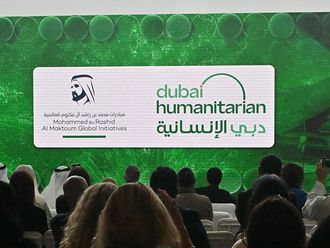Dubai: Last week’s Dubai conference on “The UAE Through its Expats’ Eyes” explored the views of some of the larger communities in the Emirates – British, Arab, and Asian. Gulf News brings you some highlights from community ‘representatives’ participating in the one-day conference, organised by the Dubai Culture and Scientific Association and Zayed University.
British perspectives
The British community is diverse and has no single social representation or voice, said Francis Matthew, Editor at Large, Gulf News.
His paper for the conference discussed how many Britons see themselves as part of Dubai rather than a part of the British community in Dubai.
“Frankly speaking, we’re not thinking too much about the UAE model – we’re just enjoying living it,” Matthew said.
He listed some of those UAE joys as “no taxes, it’s safe, good schools and people see it as a base to build a career.”
Matthew touched upon the past, “the old days” when many Britons were in the service of the Dubai government, often in high positions.
Dubai’s economic and population boom meant the British community grew even more diverse and farther from a “natural centre” in social terms.
Today, Britons make up the biggest Western expat group in the UAE, with over 120,000 people from the UK residing here. Business links between the two countries are growing fast and so is a trend where families stay for many years rather than short-stay “bachelors.”
Matthew also pointed out that the majority of Britons here generally don’t agree with some media reports in the UK on their portrayal of the 2008-2010 financial downturn in Dubai, and, more recently, of sex and drug arrests of Britons holidaying or staying here.
British expats in the UAE feel “relaxed and not concerned about the UAE legal environment”.
Asian outlook
Asians, mostly from the Indian subcontinent, increasingly see the UAE as “home is where the job is, not just where the heart is”, according to a political analyst from India, Dr N. Janardhan.
Though workers’ stay here is limited to their job contract, many reside long enough to regard themselves as “Dubai-ites” – Indian head to toe but with a strong sense of love for Dubai at heart, he said.
In fact, Dr Janardhan added, this “permanent state of impermanence” has led to a sort of a dual-personality development of third-culture and second-generation Asian expats.
He said: “[For instance] my nine-year-old son is familiar with the adhan [Muslim prayer call], some verses of the Quran and some Arabic.”
And still, non-Muslim Asians have their own places of worship in the UAE, their own customs and traditions, and a thriving social network here.
Another benefit is economic – with 33,000 Indian dollar-millionaires in the UAE in 2005, according to research cited by Dr Janardhan. They are also a leading investor group in the local property scene.
He quipped the social growth of the diaspora means they have gone from being “NRIs-Non Resident Indians - to NRI-Not Really Indians.”
However, his paper noted that though a vast majority of Indians are happy in the UAE, they sense that Emiratis can do even more to accept them in a socialising sense context.
Arab Attitudes
Arabs are most at home in the UAE due to linguistic, cultural and religious similarities with Emiratis, noted Dr Afaf Batainah, a professor at Zayed University who is a Briton of Arab origin.
She did mention an important difference, saying Emiratis’ loyalty and solidarity with the UAE leadership is rather unique compared to the situation in many Arab states.
Dr Batainah underscored that within the Arab community here there are many streams of attitudes towards the UAE and towards each other. This is down to the fact there are so many Arabs from different countries residing here.
There are those who see themselves as having an evolving culture, having spent a good part of their lives in the West before moving to the Emirates. Another segment sees itself as traditional and yet open to other cultures. A third, much smaller cross-section, is more conservative, ‘protecting’ itself from outside influence, she said.
On a personal note, Dr Batainah expressed some concern on English dominating the official Arabic, but conceded that English was the “business language” here.
She added that being so diverse, the “UAE model” was hard to pin down or define and it was ever in a state of flux. “The cultural aspects of each community differ from each other [and] our perceptions of each other should be based on that… What is different from other cosmopolitan and global cities is we all co-exist without conflict and in peace with one another.”
Numbers:
On average, an expat pays some Dh2,500 annually to the UAE government in various fees
– but the state spends about Dh14,000 on each expat per year.
60 per cent of Zayed University students polled in a recent survey are “not afraid” of expats’ presence and impact on Emirati society
48 per cent of ZU students feel the success story of the UAE is possible without expats
47 per cent of ZU students feel this is not possible












